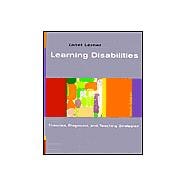
What is included with this book?
| Overview of Learning Disabilities | |
| Learning Disabilities: A Field in Transition The Enigma of Learning Disabilities Definitions of Learning Disabilities Common Elements in the Definitions Characteristics of Learning Disabilities Multiple Intelligences and Learning Disabilities Widening Age Span of the Learning Disabilities Population Prevalence of Learning Disabilities Shifts in the Settings for Providing Services Collaboration: An Important Role for Teachers | |
| Historical Perspectives and Current Directions The Foundation Phase: Early Brain Research The Transition Phase: Clinical Study of Children The Integration Phase: Rapid Expansion of School Programs The Current Phase: Emerging Directions | |
| The Assessment-Teaching Process | |
| The Assessment-Teaching Process Uses of Assessment Information The Influence of the Law on the Assessment Process The Individualized Education Program (IEP) Stages of the IEP Special Factors to Consider in the IEP for Students with Learning Disabilities Requirements for Assessing Students with Learning Disabilities Obtaining Assessment Information Examples of Tests Standards and Accountability Introduction to a Case Study | |
| Clinical Teaching Five Stages of the Clinical Teaching Cycle Ecological Considerations A Classification of Teaching Methods Controlling the Instructional Variables Building Self-Esteem and Motivation Current Trends for Instruction | |
| Systems for Providing Educational Services Important Concepts About Placement Placement Options Promoting Partnerships Between General Education Teachers and Special Education Teachers Parents and the Family | |
| Theories of Learning : Implications of Learning Disabilities | |
| Theories of Learning: Implications for Learning Disabilities The Role of Theory Developmental Psychology Behavioral Psychology Cognitive Psychology Learning Strategies Instruction | |
| Attention Deficit Disorders Characteristics of ADD/ADHD Symptoms of ADD/ADHD Assessment of Attention Deficit Disorder Eligibility of Children with Attention Deficit Disorder for Services Increase in the Number of Children Identified with Attention Deficit Disorder Treatments of ADD/ADHD Methods for Teaching Students with ADD/ADHD Accommodations for General Education Classrooms | |
| Young Children with Learning Disabilities The Importance of the Early Years The Law and Young Children with Disabilities Precursors of Learning Disabilities in Young Children Motor Development and Learning Perception Assessing Young Children Educational Environments for Young Children with Disabilities Examples of Early Childhood Programs for Young Children Early Intervention Strategies Using Computer Technology | |
| Adolescents and Adults with Learning Disabilities Adolescents with Learning Disabilities Special Issues at the Secondary Level Transition from School to Adult Life Approaches to Teaching Adolescents with Learning Disabilities in Secondary School Learning Strategies Instruction The Adult Years Computer Technology for Adolescents and Adults | |
| Medical Aspects of Learning Disabilities The Value of Medical Information for Educators Neurosciences and the Study of the Brain The Neurological Examination Early Learning and Brain Development The Neurochemistry of Psychostimulant Medications Medical Specialties Involved with Learning Disabilities IV. From Theories to Teaching Strategies | |
| Oral Language: Listening and Speaking THEORIES Oral Language, Reading, and Writing: An Integrated System Theories of How Children Acquire Language Linguistics and Language Learning Language Problems of Students with Learning Disabilities Cultural and Linguistic Diversity in Oral Language Early Literacy Assessing Oral Language TEACHING STRATEGIES Listening Speaking Computer Technology for Oral Language | |
| Reading THEORIES The Consequences of Reading Disabilities Dyslexia Stages of Reading Development A Literature-based Approach to Teaching Reading: Whole-Language Instruction The National Reading Panel: An Assessment of the Research Literature on Reading Elements of Reading Word Recognition Fluency in Reading Reading Comprehension Assessing Reading TEACHING STRATEGIES Strategies for Improving Word Recognition Strategies for Improving Fluency Strategies for Improving Reading Comprehension Special Remedial Approaches for Teaching Reading Methods of Dealing with Special Reading Problems Computers and Reading | |
| Written Language: Written Expression, Spelling, and Handwriting THEORIES Written Expression The Writing Connection in the Integrated Language System Spelling Handwriting TEACHING STRATEGIES Strategies for Teaching Written Expression Strategies for Using Word-Processing Software Strategies for Teaching Spelling Strategies for Teaching Handwriting | |
| Mathematics THEORIES Mathematics Disabilities Precursors of Mathematics Learning in Young Children Characteristics of Mathematics Disabilities Mathematics Disabilities at the Secondary Level Changing Views About Mathematics Education Learning Theories for Mathematics Instruction Assessing Mathematics Ability TEACHING STRATEGIES The Mathematics Curriculum Principles of Instruction for Students with Mathematics Disabilities Activities for Teaching Mathematics Using Technology for Mathematics Instruction | |
| Social and Emotional Behavior THEORIES Nonverbal Learning Disabilities (NLD) Emotional Problems Behavioral Considerations Assessing Social and Emotional Behaviors TEACHING STRATEGIES Developing Social Competencies Self-Esteem Strategies Behavior Management Strategies Special Features Case Study: The Process of Referral, Assessment, and Teaching of Adam Z. Phonics Quiz and Review Tests for Assessing Students with Learning Disabilities Multimedia Resources: Web Sites, Video, and Print | |
| Table of Contents provided by Publisher. All Rights Reserved. |
The New copy of this book will include any supplemental materials advertised. Please check the title of the book to determine if it should include any access cards, study guides, lab manuals, CDs, etc.
The Used, Rental and eBook copies of this book are not guaranteed to include any supplemental materials. Typically, only the book itself is included. This is true even if the title states it includes any access cards, study guides, lab manuals, CDs, etc.